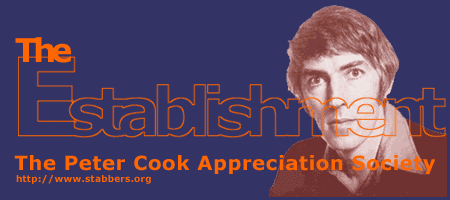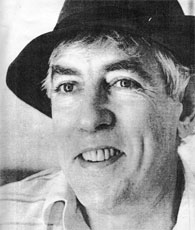|
The Age 7 March 1987
Peter Cook, fringe-dweller.
"WE FLEW QANTAS. I was whatever it was - 24 hours in the air.
People just waking up. I was sat next to quite an elderly person
and this voice came over saying (adopts Australian accent) `We are
now approaching the Australasian subcontinent and as a tribute we
will be flying upside down for the next 20 minutes.' The poor dear
was certainly taken in."
Peter Cook is sipping vodka and tonic water, smoking cigarettes
as long as tent poles and recalling his first visit to Australia
in 1972 when he and his then other half, Dudley Moore, toured the
country in their now classic revue, 'Behind the Fridge'.
"I was mugged in Sydney. I don't know what they were trying
to steal. I didn't have any money. Perhaps they were after my hair.
I don't know."
The peripatetic Mr. Cook is a virtual catalogue of travellers'
tales. A quick drag on a John Player extra-long, and a bite of a
vacuum-packed cheese sandwich, and he reflects on his recent visit
to Panama where he made a short film about a rare frog.
But is it stable down there? "Well if you don't think it's
stable there are certainly a lot of men with guns convincing you
that it is."
AT 49, COOK has filled out a bit. He is no longer the angular beanpole,
the slim, tall teller of even taller stories, but carries a pot
belly of impressive amplitude which greatly inflates an unsuspecting
T-shirt. He looks as though he enjoys a drink and certainly smokes
as if a blight on the world tobacco crop is only minutes away. In
the large living-room of his Hampstead home, he is a charming, if
slightly self-conscious, conversationalist.
The room is almost attractively cluttered, but plain disorder wins
out in the end. Golf clubs and golf balls, clothing and books are
strewn around the room. On the walls are photographs of Cook playing
golf, the odd bit of fan mail, party invitations, and newspaper
clippings, one of which details his appearance at Hampstead magistrate's
court charged with driving into the back of a police car while under
the influence.
Banned from driving for a year, he was asked how he planned to
get about. Cook, always a wag, even under the beady eve of the law,
replied: "Chauffeuse."
There is a caricature drawing of Cook with guitarist Ronnie Wood,
drawn by the Rolling Stone himself. At five o'clock one morning
Cook and Wood formed their own group, Baby Oil and the Sey-chelles.
"We rang up Mick in New York, where he was in some f. . .ing
disco - just to annoy him and to say that everything was breaking
up and Baby Oil and the Seychelles were producing this mega-hit."
The efforts of this new super group were terminally frustrated when
the batteries in the tape recorder ran flat.
Peter Cook attracts accolades. He is rightly revered as the father
figure of contemporary British satire, the first in a golden age
of writer/performers. John Cleese called him the world's most quick-on-the-feet
developer of comic ideas. Fellow Python Michael Palin (who came
second) credits Cook with changing his life. He describes Cook's
humor as a "brilliant identification of the controlled, insistent,
perfectly legal battiness that is all around". And this humor,
he says, did not exist before Cook.
"They're very nice to me, aren't they," says Cook quite
modestly.
The extent of Cook's influence and contribution to the flavor and
direction of British comedy is impossible to measure. But it goes
back a long way. By 1962, before Vidal Sassoon had cut his first
A-line bob, before Mary Quant had made her first mini-skirt, and
when Lennon and McCartney were still just a couple of lads from
Liverpool, 'Beyond the Fringe' with Messrs Cook, Moore, Miller and
Bennett had played at the Edinburgh Festival and in the West End.
By that time, Cook had also become a majority shareholder in the
revolutionary satirical magazine 'Private Eye' and he had opened
the country's premier venue for political satire, The Establishment
Club. "We had a resident team of people and did a show that
was pretty topical and had guests from America, Lenny Bruce being
the most notorious. Had him twice. Got thrown out the second time
before he could get in really. Second City came over. Did a swap.
And Dudley played jazz down-stairs with his trio and picked up a
lot of birds. It was a really good place.
Cook is thoroughly middle-class. His father was in the colonial
service and young Peter grew up in Nigeria, Gibraltar (where Cook
senior was the equivalent of the Treasurer and introduced the lottery)
and the British seaside resort, Torquay.
At Radley public school he began contributing to 'Punch' magazine,
being paid five guineas a week for a commentary on current affairs.
At Pembroke College, Cambridge, he joined Footlights for the 1959
revue. He soon had his own revue -'Pieces of Eight', with Kenneth
Williams (later of 'Carry On' fame) - running in the West End.
"I felt terribly grand when I had a revue in the West End
while I was still at Cambridge. Bought a Hillman convertible. I
felt this is it. Eat your heart out Tab Hunter."
In 1960, Cook, Alan Bennett, Jonathan Miller and Dudley Moore,
who was then at Oxford, were brought together to do a show for the
Edinburgh Festival. The show became 'Beyond the Fringe' and the
Cook/Moore partnership, and the amazing chemistry that was at the
heart of it, was born.
"That was wonderful luck. The others were all terrific. But
Dudley and I were the only ones who were not ashamed of being in
'showbiz'. Jonathan was wrestling with his conscience about whether
he should be a doctor. Alan was concerned about whether he should
continue his mediaeval history at Oxford. Dudley and I thought,
'Oh this is wonderful,' and got pissed off hanging around waiting
for the others to make up their minds whether they were going to
do the show in the West End."
After much soul-searching by the more academically inclined members
of the troupe, the show did go to the west End for two years and
then on to Broadway for a further two-year stint.
"I remember Alex Cowan, who produced the show in New York,
got very excited and rushed around saying the President (Kennedy)
wanted us to go and do the show at the White House. And I think
I said something along the lines of, 'We're not some f. ..ing cabaret.
If he wants to see it let him come to the theatre and see it.
"It was a huge security operation. Secret Service men going
though the whole theatre frisking the audience. The only thing they
didn't notice was the perfect replica of a (Colt) 45 on my dressing
room table. Didn't notice it at all."
After their hugely successful stay in New York with 'Fringe',
five films followed, including 'The Rise and Rise of Michael Rimmer'
("good script, not a particularly good film") and 'Bedazzled'
("That's the best. By a mile") and the television series,
which made Pete and Dud household names, `Not Only . . . But Also'.
Then came the filth. Very funny filth. Arguably, Cook and Moore's
finest moments were as the bombed and brutal, coarse and conversational,
oafish and objurgating Derek and Clive, a duo of unique experience,
of comedic technique so original and unhindered by convention or
common decency, as to defy comparison and preclude imitation.
Electrifying reminiscences and obscene chatter about mother-love,
masturbation, the difficulties associated with retrieving lobsters
from Jayne Mansfield's bum, the blue tit on Mrs Coletart's roof
and the agony of the eternal horn, took them into previously uncharted
waters of stereophonic recording.
Predictably, Derek and Clive were a big hit. Cook explained the
mechanics of producing the Derek and Clive trilogy - 'Derek and
Clive', 'Derek and Clive Come Again' and 'Derek and Clive Get The
Horn'.
"Got very bored in New York. Booked a studio for a bit of
a lark and got thoroughly wasted and thought, 'Oh we can't put his
out.' We didn't intend to put it out. I don't know why we did it
at all. To pass the time. Then so, many pirate cassettes got out
so we thought to hell with it, we might as well put it out. So we
did two more the same way. Arrive straight and get stoned and bombed
and say whatever comes into our heads. F...ing around for a few
hours."
In 1976. Cook and Moore returned to the US with the revue, 'Good
Evening'. When the tour ended, so did the partnership. "Yes,
he stayed on. He wanted to do movies. Our last stop on the tour
was Los Angeles and he stayed there, much to my chagrin. And he
did marvellously well. I thought it was terrific he got to do what
he really wanted to do. He's such a good actor.
"Yes, he came to the fore in Arthur'. He's very good acting
at being pissed isn't he? "Yes, he is also very funny when
he actually is pissed, which is not very often. But after each 'Not
Only . . . But Also' show we'd have a small party at a restaurant
and he'd always end up standing on the table, making ludicrous speeches
which were very, very funny indeed."
Comparisons about their relative progress are inevitable, if somewhat
irrelevant. While Moore has determinedly pursued, with great success,
a career in Hollywood. Peter Cook, the team's writing force and
visionary, has appeared almost lost without his former partner.
The past decade or so have seen Cook doing the odd guest appearance
in charity shows like 'The Secret Policeman's Ball', an occasional
commercial, hosting comedy shows and film appearances in 'Supergirl'
and 'Yellowbeard'. In his new film, 'Whoops Apocalypse', he plays
the British Prime Minister, Sir Mortimer Chris, an eccentric role
which allows him to start World War Three.
He has also done a couple of television series, including the US
sit-com, 'The Two of Us', which was cancelled after one season.
There have been guest spots and chat shows (he did the 'Joan Rivers
Show' with Dudley recently). "Anywhere with a chat show in
the warmth. Midnight radio in Kenya. I'm all in favor of that."
He works two or three days out of every fortnight at 'Private Eye'.
and writes sketches and is working on a film. He and Moore are also
compiling a "best of" series of the their favorite sketches
and Methuen are about to publish the scripts from 'Beyond the Fringe'.
Cook obviously deeply misses Moore and the anarchic rapport they
shared. They would like to collaborate on another project. "We'd
like to do something together but we don't know what it is. It's
very easy to slip into Pete and Dud. I mean we can do those characters
easy."
Cook lights another cigarette. He finishes his sandwhich and sips
his drink. He seems slightly nervous, perhaps a bit melancholy.
The telephone rings and, not wishing to interrupt our conversation,
he politely ignores it, leaving the reply to his answering machine.
A series of beeps and an unmistakeable voice comes on the speaker..
"Ah, Mr Cook, it's Mr Moore here speaking from snowy Los Angeles.
. ." Cook immediately grabs the phone and the transformation
is immediate and astounding. The call has flicked a switch in Cook
and he moves easily in and out of a variety of accents, stories,
jokes and day-to-day chatter. It's Peter Cook and Dudley Moore's
'On The Phone'.
Cook, in his best pompous voice. "I beg your pardon, is that
Mr Moore. I'll just see if Mr Cook can be taken out of the Jacuzzi.
He is currently surrounded by nubile women and has asked to be disturbed."
(Cook is laughing, excited. Moore is a distant shriek on the receiver).
"Oh that awful f. . .ing woman. About 70 now ... trailing
along her spangled dress trying to impress you with her monocle.
It would be a lot better if she had an eye behind it in my view."
(Shrieks from LA).
"I don't want to see magnified sockets when I'm just trying
to have some ravioli . . ."
(Maniacal laughter).
"Are you working at the moment. Is it about arm wrestling?
Bloody good idea. What? You're a Welsh choirboy and decide to wrestle
with everyone you meet. And I suppose you meet some tall woman and
you wrestle her to the ground."
(Another shriek). '
"Yes, what can you do but hang a little bit of bread on a
hook over the coal mine and hope they come out blinking into the
dawn . .."
(Moore is now laughing so hard he sounds as though he is going
to expire at any moment).
"I'm f. . ing off to Australia on Monday for three weeks.
Yes, I'm opening a supermarket. I'll get all the Tide or maybe all
the Ariel I need for life. And then I'm booked in to do cabaret
in Dunedin ... No, should be nice. Melbourne Festival of Comedy.
I'm there to counterbalance that aspect of it. . . Yes, readings
from Goethe. . ."
(End of conversation. Exit Moore. Exit Cook. Both laughing).
© "The Age" March 07 1987
Return to >>> The
Spiggott
|


